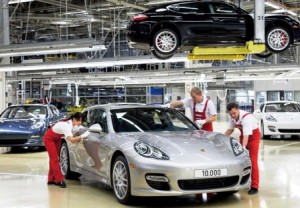
German steel workers are seeing bigger raises than the companies are offering, hurting German auto production.
German automakers are still reeling from the diesel emission scandal at Volkswagen, but now they face a new challenge from wage demands of IG Metal, the influential metal workers union, which represents more than 3.7 million workers employed in the steel and car industries.
Last month, IG Metall rejected a 2.1% wage increase proposed by the employers association, negotiating for the companies. The union followed up the rejection of the wage proposal with a series of warning strikes or brief walkouts only hours long in the old West German industrial heartland at plants belonging to Daimler, Porsche, Audi and Ford as well as the steelmaker Arcelor Mittal as well as dozens of smaller companies.
Warning strikes are part of the bargaining process in Germany and the last major wage dispute between the employers an IG Metall was in 2002 when Germany was struggling to escape a recession.
However, the wage agreement between the union and the employers’ federation Gesamtmetall expired in March and the side have been struggling to reach an agreement. IG Metall is demanding pay increases of 5% in view of the comfortable profit situation in many companies in the sector.
(Early investigation results clear VW execs of wrongdoing in diesel scandal. For more, Click Here.)
It has rejected Gesamtmetall’s offer of a pay rise of 2.1% over a two-year period.
Germany’s labor costs now rank amongst the highest in Europe and BMI Research believes rising wages will erode the country’s export competitiveness compared with regional peers, as Germany productivity growth will be slower than wage growth.
(Click Here to see more about VW’s plans to meet with the UAW.)
Overall, the autos sector is critical to the German economy as a whole as it accounts for around 19% of the country’s total exports. Germany’s labor cost index – an indicator of hourly labor costs incurred by employers – has increased since 2013 and reached an all-time high in the fourth quarter.
“These high labor costs mean Germany will be an unattractive destination for carmakers looking for both greenfield and brownfield investment locations, which will play to the advantage of countries in central and eastern Europe that have lower labor costs,” according to a recent research note from BMI.
(VW to spend $8.8 bil to repair or buy back rigged U.S. diesel vehicles. Click Here for the latest.)
“Poland and Slovakia will be attractive alternate investment destinations for carmakers looking for locations to expand production volumes thanks to these countries’ lower labor costs, attractive policies aimed at winning investment into their local autos industries (including tax breaks), high quality of skilled labor in manufacturing and their close proximity to eastern and western Europe,” BMI researchers added.
